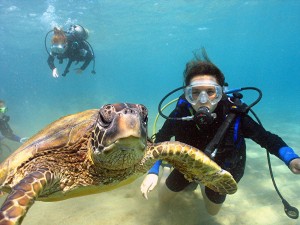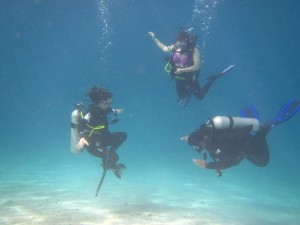A massive sicklefin lemon shark suddenly interrupted fourth-year marine biology student Emily Ferrari’s scuba dive, leaving her watching, amazed, as the rare creature swam off into the tropical waters of the South Pacific.
Although she has been scuba diving since high school, Ferrari said the seven-foot-long shark she saw in spring was the most impressive thing she has ever seen as a diver. She said seeing underwater sights like the shark inspired her and her friends to establish UCLA’s SCUBA Club and introduce others to the underwater world of color and biodiversity.

Five fourth-year students founded SCUBA Club at UCLA to continue their diving experiences after the Department of Ecology and Evolutionary Biology’s Marine Biology Quarter last spring. The club, which now has about 40 members, met for the first time late in fall quarter and are still recruiting new members.
The Marine Biology Quarter, an opportunity for students in the ecology and evolutionary biology department to earn credit by doing research in the field, involved many diving trips in order to observe local wildlife. After their return from Moorea, French Polynesia, the students decided they wanted to organize diving trips in California.
“The idea grew from there that for such a big school there’s probably a pretty large scuba community as well,” said club officer Chris Leber, a fourth-year marine biology student. “So we could get a community together where we could get dive buddies to talk about diving and that sort of thing.”
Though the club officers are all life science students, they said they established SCUBA Club with the hope of attracting all student divers and anyone interested in diving.

“We want to bring together the community, obviously, but we’re trying to also get other people interested in scuba,” said Binal Patel, fourth-year marine biology student and club officer.
SCUBA Club does not organize dives for liability reasons, but it encourages students to find friends to dive with, said Aislinn Dunne, a fourth-year ecology, behavior and evolution student and club officer.
Still, Patel said he thinks the club fills an essential role of uniting the diving community, since many divers may be unaware of the size of the community at UCLA.
Since scuba divers must dive together for safety, SCUBA Club allows divers to network together to continue to pursue their passion in college. This is essential as divers check each other to ensure that their equipment is on properly and watch out for each other as they explore underwater.
Using SCUBA Club as a forum for finding friends to organize dives, many students may get to experience diving along the rich and diverse California coast, Ferrari said.
“Around here, in the Channel Islands they have really beautiful kelp forests,” Dunne said. “People always think of the tropics when you think of beautiful, colorful places to dive, but right off our coast there are really amazing, pristine kelp forests. They’re very full of life.”
The officers said they think seeing underwater wildlife is the most captivating aspect of diving along the California coast. Although the water is a lot colder than in the tropics, meaning divers are more hindered by wetsuits, the vast scale and diversity of kelp forests make it all worthwhile, Dunne said.
“It’s just so massive, like 70 feet down,” Patel said. “You’ll see kelp that reaches the surface and it’s freaking tall. I always get awed.”
Unlike in above-ground forests, where people usually only experience the forest floor, in kelp forests divers can swim up, down and through thickets of kelp, seeing and feeling the environment from all angles.
“There’s a lot of pulling kelp out of your fins and stuff, but when you get there, there are animals like sea lions, garibaldis and leopard sharks, and they’re really pretty,” Ferrari said.
More generally, the free exploration of the experience of scuba is one of the most exciting aspects of diving, Leber said.
“It’s something that most people can only discover through videos and things,” Dunne said.
Leber said he thinks that just being able to move in three dimensions in a way that humans cannot do on their own, and exploring the underwater realm unknown to most people, attracts scuba divers.
“You’re not supposed to be breathing underwater, but we do,” Patel said.
